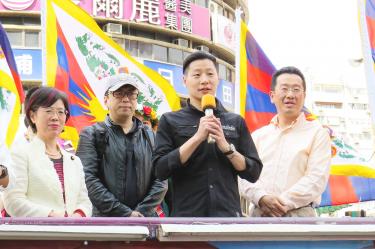More than 200 people from more 20 civic groups and lawmakers marched through downtown Taipei yesterday in a call to free Tibet and uphold human rights.
The march was to commemorate Tibetan Uprising Day — the March 10 anniversary of a failed 1959 uprising against Chinese rule — which sparked a sharp crackdown and led to the Dalai Lama’s exile.
Members of the Welfare Society for Tibetans in Taiwan (在台藏人福利協會), Human Rights Network for Tibet and Taiwan, Taiwan Association for Human Rights and other groups gathered in front of Pacific Sogo’s Zhongxiao E Road department store for a rally before setting off on the march, with numerous speeches by legislators expressing solidarity with the Tibetan cause.
New Power Party (NPP) Legislator Freddy Lim (林昶佐) called for President Ma Ying-jeou (馬英九) and president-elect Tsai Ing-wen (蔡英文) to allow the Dalai Lama to visit Taiwan.
“President Ma has said many times that cross-strait relations have never been better, so I cannot think of a better time,” Lim said, adding that the president has cited a need to repair cross-strait ties in denying previous visits.
Ma’s government has refused to grant a visa to the Dalai Lama since his previous visit in 2009.
Democratic Progressive Party (DPP) Legislator Tsai Yi-yu (蔡易餘) said that Tibet should serve as a “warning” of what might happen to Taiwan, calling for the Executive Yuan’s Mongolian and Tibetan Affairs Commission to be frozen to express solidarity with the Tibetan cause.
“The function of the commission is not clear and it looks like a deformity even when run by the Republic of China, because Mongolia does not belong to China anymore. That we still use the ‘Republic of China’ framework to lay claim to Tibet is at odds with their struggle for human rights and freedom,” Tsai Yi-yu said, adding that he would propose a refugee act to allow Tibetan exiles to be granted asylum.
DPP Legislator Kolas Yotaka — a Yami Aborigine elected on the party’s at-large legislative slate — said that Aborigines and Tibetans face similar challenges.
Tibetans “are like China’s indigenous people, so we feel for them and should support them both in spirit and politically,” Yotaka said, adding that Aborigines and Tibetans desire true autonomy to protect their cultures.
“We were both originally independent nations, but have been losing our political systems, social structures, religious beliefs and languages ever since colonizing powers came,” she said.
The group sang the Tibetan national anthem, while Tibetan monks prayed for a long life for the Dalai Lama before they marched away to chants of “Free Tibet” and “Long Live the Dalai Lama.”
A large portrait of the Dalai Lama led the procession, followed by more than a dozen Tibetans waving large Tibetan flags.
The group marched to the Kelti Building, which is often used to symbolize the Chinese government in the absence of a formal representative office, as it houses the offices of the Cross-Strait Economic and Cultural Interchange Association, the Bank of China and other Chinese associations and firms.
The group held a “die-in,” sprawling on the road in front of the Kelti Building in solidarity with Tibetan monks who have self-immolated to protest Chinese rule of Tibet.
The group marched to Taipei 101, saying they wanted to share their message with Chinese tourists.
Source: Taipei Times - 2016/03/06





















